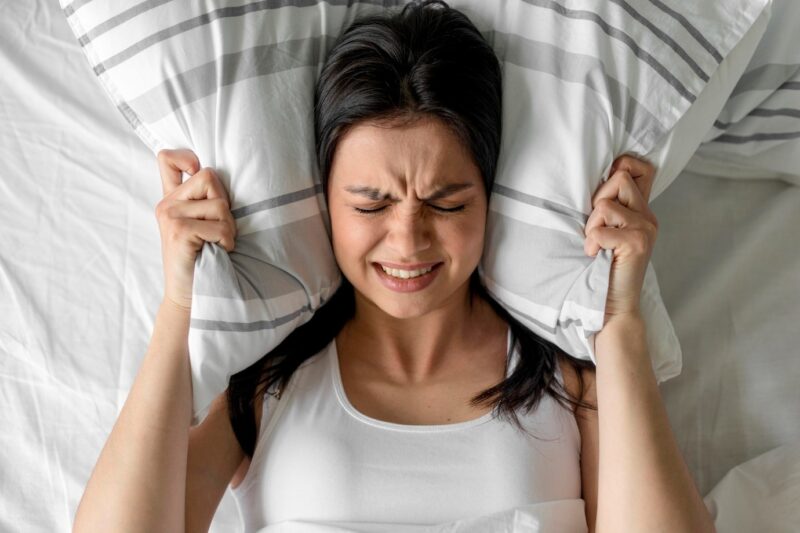In today’s world, balancing the demands of daily life with adequate rest can be challenging, especially when stress enters the equation. Stress, a common aspect of modern living, has a solid impact on sleep quality and duration. When you understand how to manage stress and improve sleep hygiene, you will get overall health and well-being. This article delves into practical strategies and tips for enhancing sleep quality, even in stress.
The Vicious Cycle of Stress and Sleep

Stress and sleep have a bidirectional relationship; stress will lead to problems, and lack of sleep can increase stress levels. It’s important to understand this interplay to address sleep issues effectively. Stress activates the body’s fight-or-flight response, making it difficult to unwind and sleep. Conversely, insufficient sleep can heighten stress sensitivity, creating a cycle that’s hard to break.
Sleep Disturbances
Common signs of stress-induced sleep disturbances include difficulty falling asleep, restless nights, and waking up feeling unrefreshed. These symptoms often result from the mind’s inability to shut down due to ongoing worries and anxiety. Recognize these patterns as they are the first step towards implementing changes for better sleep.
Relaxing Bedtime Routine
Creating a bedtime ritual is a powerful tool for combating stress-related sleep issues. A consistent routine signals your brain that it’s time to wind down and prepare for sleep. This ritual could include reading, listening to calming music, or practicing gentle yoga. The key is consistency and finding what uniquely works for you.
The bedroom should be a sleep sanctuary, free from technology disruptions. The blue light from electronic screens stops melatonin production. This hormone is essential for regulating sleep cycles. Establishing an environment free of technology promotes a more favorable setting for relaxation and restful sleep.
Nutrition and Sleep

The connection between what we eat and how well we sleep is frequently underestimated. Certain foods and beverages can either promote restfulness or contribute to restlessness. For instance, caffeine and sugary foods can disrupt sleep patterns, while foods rich in magnesium and tryptophan, like bananas and almonds, can aid in relaxation and better sleep.
While hydration is essential for overall health, balancing fluid intake is crucial for uninterrupted sleep. Drinking too much water right before sleeping can result in frequent nighttime bathroom visits, disrupting the continuity of your sleep cycle. Aim for balanced hydration throughout the day.
Physical Activity
Regular exercise is a potent stress reducer and can significantly improve sleep quality. Engaging in physical activity, especially aerobic exercises like walking, running, or swimming, can enhance the depth and duration of sleep. However, timing is key; exercising too close to bedtime can be stimulating rather than relaxing.
Incorporating mindful movement practices like yoga or Tai Chi can be particularly effective in reducing stress and improving sleep. These exercises combine physical activity with mindfulness, helping to calm the mind and prepare the body for rest.
Cognitive Behavioral Strategies
Cognitive Behavioral Therapy for Insomnia (CBT-I) can become an effective treatment for sleep disturbances, particularly those exacerbated by stress. CBT-I involves changing sleep habits and addressing the thoughts and attitudes that hinder sleep.
Practical CBT-I techniques
- Establishing a regular sleep schedule.
- Using the bed only for sleep.
- Learning to associate the bedroom with relaxation rather than stress.
Additionally, cognitive restructuring helps address the negative thoughts that often accompany sleeplessness.
CBD for Better Sleep

In recent years, CBD (cannabidiol) has gained attention as a potential aid for improving sleep. CBD is known for its relaxing and stress-reducing properties without the psychoactive feeling of high associated with THC. Many people find that using CBD products, such as oils, tinctures, or tablets bought at CBD.market, helps in calming their minds and easing anxiety, which can be conducive to better sleep. Research suggests that CBD may impact the sleep cycle positively and aid in managing conditions like insomnia.
FAQ
1. What are some quick relaxation techniques for better sleep?
Quick relaxation techniques for better sleep include practicing deep breathing exercises, progressive muscle relaxation, and listening to soothing music or guided meditation.
2. How does diet affect sleep quality?
You will likely sleep better when you avoid caffeine and heavy meals before bedtime. Additionally, foods rich in tryptophan and magnesium, like bananas and almonds, can help induce sleep.
3. Can exercise too close to bedtime affect sleep?
When you avoid caffeine and heavy meals before bedtime, you will likely better sleep. Additionally, foods rich in tryptophan and magnesium, like bananas and almonds, can help induce sleep.
4. What are the best practices for a sleep-conducive bedroom environment?
The best practices for creating a sleep-conducive bedroom environment involve maintaining a dark, quiet, and cool room, using comfortable bedding, and minimizing exposure to electronic devices and blue light.
5. How can I break the cycle of stress and poor sleep?
Establish a consistent sleep routine, create a relaxing pre-sleep ritual, manage stress through meditation, avoid stimulants, and maintain a healthy lifestyle that includes regular exercise. If challenges persist, seeking professional advice can be beneficial.
When To See a Healthcare Provider

If you frequently have trouble falling asleep or staying asleep or often wake up feeling unrefreshed, these could be signs of a more serious sleep disorder. It’s time to seek professional advice if your sleep problems are affecting your daily life, causing you to feel irritable or depressed, or impacting your concentration and memory. In cases where sleep disturbances are accompanied by other issues, such as chronic pain or stress, a healthcare provider can help address the problem’s root cause.
Conclusion
Improving sleep, particularly when under stress, is a multifaceted approach that involves lifestyle changes, relaxation techniques, and sometimes supplements like CBD oils. You can significantly enhance your sleep quality by implementing strategies such as establishing a relaxing bedtime routine, optimizing your diet, engaging in appropriate exercise, and creating a conducive sleep environment.
Remember, good and sound sleep is important for your health, and taking proactive steps to achieve it is key to managing stress and maintaining well-being. If sleep issues persist despite these efforts, seek professional advice tailored to your needs. Remember, a good night’s sleep isn’t just a dream; it’s an achievable reality with the right practices.

